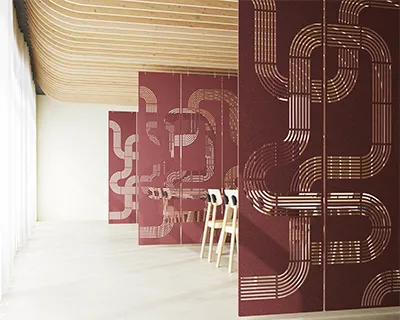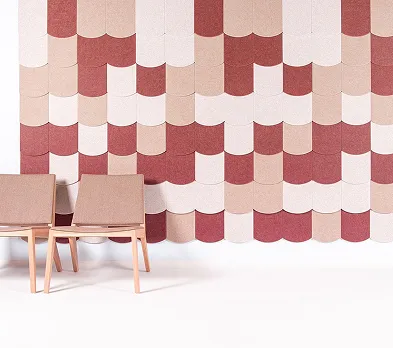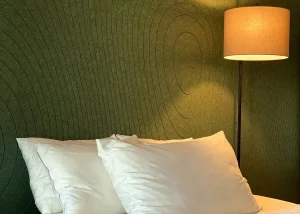Avoid your inquiry is delay response, please enter your WhatsApp/Skype along with the message, so we can contact you at the very first time.
We will reply you within 24 hours. If for urgent case, please add WhatsApp/WeChat: +86-13678899682 directly.
Busy rooms echo. Voices bounce off hard surfaces and muddle speech.
Meetings drag, kids can’t focus, and clients hear a dull roar.
Decorative acoustic wall panels tame sound waves, clean up speech, and lift the look of your space—without turning it into a studio.
Decorative acoustic wall panels are engineered surfaces that combine style with sound absorption. They reduce reverberation, improve sound quality, and deliver a finished interior. Typically made from PET felt, wood veneer, fabric, or foam, each acoustic panel targets reflections to make rooms clearer and calmer.

Decorative Acoustic Wall Panels
When sound waves hit a smooth wall, they reflect. The energy builds as reverberation. That’s why restaurants or open-plan offices feel loud. An acoustic panel interrupts this cycle. Its fiber structure turns acoustic energy into tiny amounts of heat—classic sound absorption—so speech stays clear and music stays true. In short, acoustic panels minimize sound reflections, which helps people hear better and feel less tired.
At a material level, fibers and pores create resistive airflow paths. These microscopic paths absorb sound most where we need it: speech frequencies. Install a few panels at “first-reflection” spots and you’ll minimize sound reflections and create a calmer room without over-treating the design. For broad coverage in busy corridors, acoustic panel arrays work even better.
Looking for a felt option that blends with contemporary interiors? Many teams start with polyester fiber acoustic panels or PET polyester acoustic panels like these, which are lightweight and easy to trim.
Selecting the right acoustic system is about surface area and coverage. On wall panels, start with the talker–listener line to stop early reflections; add a ceiling cloud if the room is tall or has a hard floor. In larger spaces, distribute panels evenly to avoid “bright” corners.
Balance looks and performance. Timber slats, colored PET felt, or fabric wraps all solve the same acoustic problem differently. Designers often mix acoustical solutions—like slatted walls plus ceiling baffles—to keep sightlines clean. Our factory background helps teams match finish samples, coordinate shop drawings, and deliver an acoustic panel package that lands on time.
For natural warmth, many architects pair felt with wooden acoustic panels. When you need higher coverage without heavy framing, consider acoustic panel clouds under the ceiling.
Decorative acoustical wall panels aren’t a magic “soundproof” switch. Panels treat echoes inside the room (that’s noise control), not the transmission through walls. To block sound leaving or entering, you need mass, airtight layers, and decoupling (drywall, insulation, resilient channels). Panels fix clarity; walls fix isolation.
If you’re fighting transfer between rooms, combine a proper wall assembly with in-room panels. For an easy start, see these practical options for soundproof wall panels to improve clarity on your side of the wall.

Are decorative acoustical wall panels soundproof?
Acoustic felt wall panels (PET) are durable, cleanable, and color-fast. They’re great for schools and offices where bumps happen. PET is typically recycled and eco-friendly, and it cuts cleanly on site. As a versatile acoustic panel, felt delivers reliable mid-frequency control.
Wood fiber acoustic panels add warm texture with a natural binder. They act as absorbing panels while offering a crafted finish. In lobbies or galleries, wood fiber reads premium yet practical. If you need pattern flexibility, wood fiber can be routed or perforated.
Acoustic foam panels are lightweight and fast to mount. Use them where a soft visual is acceptable—studios or practice rooms. Sculpted profiles like pyramid acoustic foam increase surface area for better diffusion. For a quick-fit kit, many teams reach for acoustic foam or foam panels in back-of-house rooms where a plush look is fine. For higher durability in public zones, felt or veneer beats foam.
Want felt options? Explore PET felt acoustic panels built for frequent touch. For wood warmth, these wooden acoustic panels are a strong fit for front-of-house spaces.
Acoustic doesn’t have to look “technical.” Use design to add rhythm and light play. Arrange modules in a tile pattern, step the seams, or rotate square panels 90° for a woven effect. You can also mix colors for gentle gradients that read modern.
Prefer timber? Slatted paneling breaks up long corridors and gives dimensional walls without heavy carpentry. If you need a truly dimensional look, slot-cut or V-groove faces add lines that catch light throughout the day. For gallery-like spaces, art acoustic panels double as a statement and absorber, elevating the décor while still working hard.
Browse wall-art options here: acoustic wall panel art for curated surfaces that perform.
Acoustic performance starts with NRC (how much sound a surface absorbs) and STC (how much a wall blocks). For clarity, target a shorter reverberation time so words don’t smear. Keep ambient noise low by treating HVAC and choosing quiet finishes.
Indicative NRC by material (typical, project-specific):
| Material (typical build) | Indicative NRC | Notes |
| PET felt 9–12 mm | ~0.75–0.85 | Great all-round acoustic panel choice |
| Fabric-wrap 25–50 mm | ~0.80–0.95 | Deeper core = more low-mid control |
| Slat wood + felt backing | ~0.65–0.85 | Absorb + scatter for pleasant acoustics |
| Formed foam profiles | ~0.50–0.80 | Light, studio-friendly |
Pro tip: you can’t manage what you don’t measure—walk the room, clap, and listen. If the tail lingers, you likely need more coverage for noise reduction.
For isolation problems, adjust the assembly (mass, sealant, decoupling) first; panels then fine-tune acoustic sound inside. When you plan wall and ceiling treatments together, you spread absorption evenly.
Modern systems ship ready for easy installation: peel-and-stick tabs, Z-clips, or simple screws. Many panel products are easy to install with common tools; panels are installed after painting and lighting so they stay pristine. Some finishes are paintable (check your spec), letting you refresh color without a re-fit.
Panels come in standard sizes and can be field-trimmed for outlets or signage. When mounting across panels for walls and ceiling clouds, align seams with lights and sprinklers for a clean datum. For graphic textures that still absorb, look at engraved V-slot PET panels.
A conference room needs crisp speech. Treat the talker–listener line, and add a baffle or two if the table is long. In home theaters, combine front-wall absorbers and side reflections for tight imaging. In a workspace, panels near busy paths keep chatter from spilling into focus areas.
In commercial spaces, lobby ceilings and corridor walls benefit from mixed absorbers and acoustic partitions. Panels can be used behind reception desks to keep phone calls private. In a residential space, a small family room may only need a few pieces to reduce noise and tame sound echo.
This mix-and-match set for offices is a fast start: acoustic panels for conference room and acoustic panels for home theater.

residential space
Budgets vary by finish, thickness, and hardware. Felt and veneer offer great value; fabric wraps climb with thickness and edging. We provide customizable sizing, edge profiles, and colors so you can hit your look and unit cost together—true customization guided by shop drawings and samples.
If you need high-performance coverage, we can model placement so you use acoustic panels efficiently—more effect with fewer parts. For brands with sustainability goals, our PET felt is often eco-friendly and recyclable. If your brief calls for strict acoustic control, we tune density, spacing, and backing to the program (call rooms vs. atria). We also supply sound absorbing products purpose-built for gyms and multipurpose halls.
See how teams specify custom acoustic panels and pair them with slats or clouds for the right acoustic fit.
What’s the difference between an acoustic panel and acoustical panels?
They point to the same idea: a surface that absorbs sound to control acoustics. We use acoustical panels in specs and acoustic panel in casual talk.
Do decorative wall panels actually help with sound?
Yes—panels help reduce reflections so speech is clearer. They’re sound absorbing, not blocking. Think clarity, not isolation. In design language, they are a decorative wall finish that performs.
Are these only for walls?
No. You can hang clouds under the ceiling, treat columns, or place panels for walls where people sit. Some collections are modular tile kits; others arrive pre-cut.
How do I get a comfortable acoustic space without over-treating?
Start at first-reflection points and measure. A few panels can create a comfortable acoustic environment quickly. If the tail still lingers, add more where people gather.
Can decorative acoustic panel options be paint-matched?
Many can be paintable, or ordered in house colors. Felt and veneer colorways vary; check swatches. A decorative acoustic panel that’s color-matched blends quietly into brand standards.
Where do slats, partitions, and baffles fit?
Slats add warmth and micro-diffusion; acoustic partitions zone open plans; baffle arrays target long corridors. Used together, they form an acoustic solution that’s flexible and scalable.
Room type vs. coverage (rules of thumb)
| Room Type | Target Coverage of Wall/Ceiling Area | Notes |
| Huddle / Meeting | 20–35% | Focus on early reflections for speech |
| Classrooms | 25–40% | Keep intelligibility high for learners |
| Open Office workspace | 20–30% | Mix wall panels + clouds for balanced feel |
| Gyms & Atria | 30–50% | Treat height; add clouds over courts |
Material and look
Performance cues
As a China-based producer of PET and wood systems, we build what we design, then ship globally. That means consistent batches, clear timelines, and factory-level QC. For roll-outs across commercial spaces, we package hardware, label parts, and coordinate logistics so panels arrive ready to hang. We help specifiers choose finishes that reduce noise inside the room while complementing brand standards and décor.